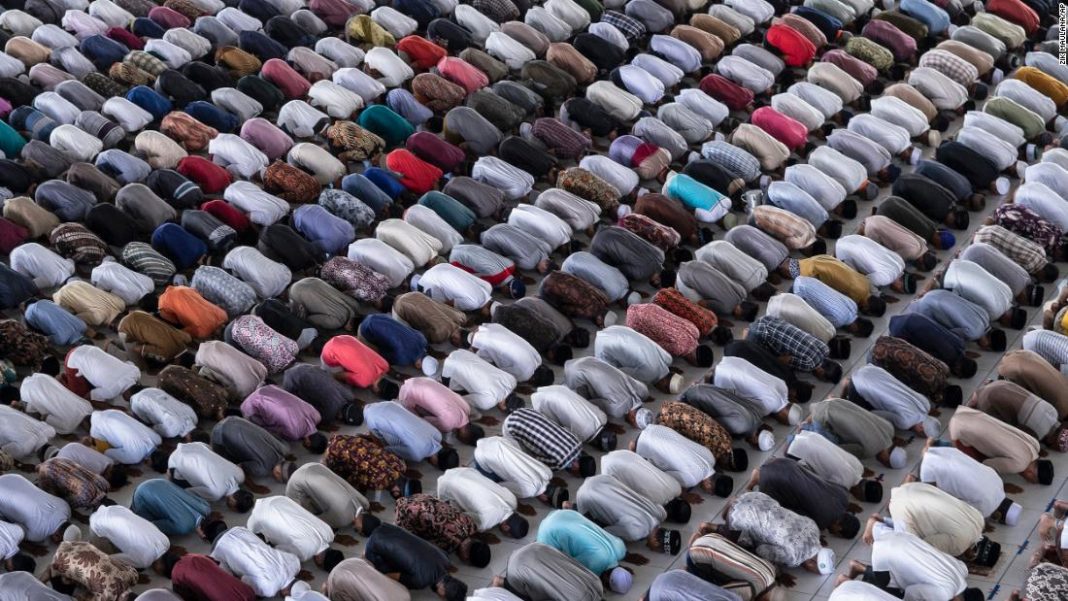Indonesia has temporarily banned domestic road, air and sea travel starting Friday to prevent the spread of coronavirus, as millions of Muslims mark the start of the holy month of Ramadan.Indonesia has the world’s largest Muslim population, and tens of millions of people make their way home to celebrate the end of Ramadan each year with families and loved ones, an annual tradition called mudik.But the country is grappling with rapidly rising numbers of coronavirus infections and there are concerns that the mass migration home for Idul Fitri — the Indonesian name for Eid al-Fitr, the celebration that marks the end of the month-long Ramadan fast — will spark further Covid-19 outbreaks.In the early stages of the pandemic, Indonesia was a regional outlier, not reporting any Covid-19 cases until early March. Now, the country has the second-worst outbreak in Southeast Asia, behind Singapore. To try to prevent the disease spreading further, all holiday travel in the country has been banned, with public transport between major cities suspended from Friday until May 31. Tens of thousands of troops are being deployed at checkpoints to enforce the regulations.
Private vehicles and motorbikes have been banned from traveling in and out of the major cities that are Covid-19 hotspots, known as “red zones.” In these places, stricter lockdown measures are in force to contain the virus. The Greater Jakarta area is one such zone, where coronavirus has spread rapidly in the past month. Indonesia has recorded 8,211 coronavirus cases and 689 people have died, according to government figures. Indonesian President Joko Widodo declared a national public health emergency on March 31 but has not issued a nationwide lockdown. This year, Indonesian Muslims will be observing Ramadan in very different circumstances. Strict social distancing measures in coronavirus hotspots, such as the capital Jakarta, prevent families and friends from visiting each other and breaking their fast together with the iftar meal. Indonesia’s Ulema Council and Nahdlatul Ulama, the country’s largest Islamic organizations, called for Muslims not to pray together in the mosques. The government has not implemented a ban to close any mosques at this stage.”There is no splendor on the streets, the mosque space is in silence, the new atmosphere we will feel, absorbing the true meaning of fasting that we run,” President Joko Widodo said, encouraging Muslims to focus on private prayer and make fasting a personal worship.”Let’s welcome the blessing Ramadan as a moment to break the chain of transmission of the plague for the sake of personal safety, relatives and the entire nation.”
Ramadan travel banned
The restrictions on travel have been timed to coincide with the peak of the exodus, which usually happens one week before Idul Fitr, when most residents of Jakarta and other big cities travel to their hometowns and villages to celebrate with relatives.Train services will be suspended until June 15, while the ban on air travel will be in place until June 1, and travel by sea restrictions will be in place until June 8, Indonesian Transportation Ministry spokesperson Adita Irawati confirmed. Cargo transportation is exempt from the ban.”Some exceptions are allowed for logistics, food supply, medicine supply, transportation for paramedics, fire department, and ambulance,” Irawati said.She clarified that the measures don’t constitute a complete blockade of national roads and highways, but there will be checkpoints established to implement the ban.
Indonesia will deploy 175,000 military personal, police and public order officers from April 24 to seven days after Idul Fitri, Indonesian Police Spokesperson, Brigadier General Argo Yuwono, said 2,582 security and service police posts have been set up around the entrance to Jakarta and other major cities. The date for Idul Fitri has not yet been set — it will be decided by government on the 29th day of Ramadan — but the holy month usually lasts for 30 days.Those caught violating restrictions over the next two weeks will be directed back to their starting point, while those who continue to travel from May 7 to 31 will also be fined, Irawati said. The President announced the travel ban at a cabinet meeting in Jakarta on Tuesday. He said the decision to ban holiday travel was based on a survey held by the Transportation Ministry which found that 24% of people would still travel home despite social distancing restrictions in place. A police spokesperson said the volume of cars that left Jakarta through main highway on Thursday increased 27% from the day before.
Social distancing during Islam’s holiest month
For Muslims, a big part of the holy month consists of special night prayers called “taraweeh,” held daily at the mosque.While Indonesian Muslims have been advised to avoid praying in large groups, mosques remain open. In some rural areas, villagers say they have formed taskforces to implement social distancing and hygiene measures while continuing to pray.Shabbarin Syakur, an activist with the Islamist group Majelis Mujahidin, in Cemani village in Sukoharjo District’s Central Java Province, said almost all of the 30 mosques in his town are still open for group prayers like Friday prayers. “Last night I went to my big mosque with other one hundred people to do Tarawih, or night praying, in Ramadan. I am not scared or afraid because we are living in a green zone and we also do a Covid-19 protocol in the mosque,” he said.A green zone is an area that has no confirmed cases of coronavirus, but are under surveillance.Shabbarin said that villagers have formed a taskforce in every mosque and provide soap and water to wash hands before entering, spray disinfectant and hand out masks. They ensure worshipers form a line line and keep a safe distance apart while praying inside the mosque.”At the same time we also shortened the praying duration, erasing Imam’s speech, and breaking fast together in the mosque,” he said.”The situation here in the villages are different than in Jakarta. So we educate villagers that they don’t really need to be panic or scared. Instead we educate them on how to be safe and secure themselves by understanding Covid-19 protocol in our mosque. So we can still do fasting month in Ramadan in peacefully,” he said.













![Hotstar Premium Cookies 2019 [*100% Working & Daily Updated*] Hotstar Premium Cookies 2019 [*100% Working & Daily Updated*]](https://tahav.com/wp-content/uploads/2019/11/Hotstar-Premium-Cookies-Free-100x70.jpg)



